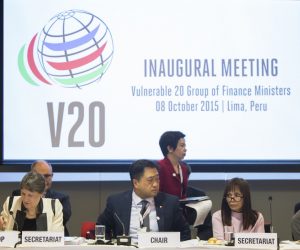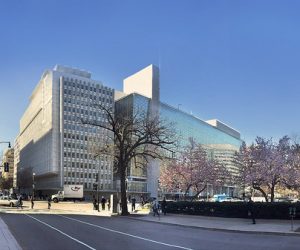Ghana and Sri Lanka Presidents call for accelerated liquidity and investments in Climate Prosperity Plans

Sharm El-Sheikh, 8 Nov 2022 – President Nana Akufo-Addo of the Republic of Ghana, Chair of the Climate Vulnerable Forum, and President Ranil Wickremesinghe of Sri Lanka today called on the international development community, in particular financial institutions, for accelerated investments in the Climate Prosperity Plans of countries most threatened by climate change. Sri Lanka launched its Climate Prosperity Plan during COP27 focussing mainly in raising its renewable energy production to 75% as well as modernizing its electricity infrastructure as a fundamental step towards shifting the country’s economic strategy.
President Nana Akufo-Addo: “As most climate-threatened nations, we can no longer attain our development goals because of the climate-insecure world we find ourselves in. We must have a strategy to enable us to prevail despite climate adversity. Through our Climate Prosperity Plans, we plan to take climate actions that are bold and make sense for our development as we seek prosperity.”
“The main hurdle that vulnerable developing countries face in climate action is adequate fundsfinance. We lack the resources of our wealthy counterparts. Our fiscal space is under constant pressure from the impacts of climate change. And the negative effects of climate change are also worsening the already high cost of capital that we face to mobilize commercially viable investments. Climate Prosperity Plans are our investment and financing strategies. But we will not succeed unless the international community comes forward and supports us. In particular, I would like to see the full support of the IMF’s Resilience and Sustainability Trust and the support of all the Multilateral Development Banks behind our climate prosperity plans program. We need to grow, not shrink, our economies as we face the climate crisis.”
Sri Lanka recently went through severe economic distress caused by high debt servicing and energy price volatility. The country has taken measures to open up the electricity market for more renewables like solar and wind, with grid modernization, as part of its strategy to reduce exposure to volatile and expensive fossil fuels.
President Ranil Wickremesinghe: “In our Climate Prosperity Plan, our renewable energy generation will increase from 35% to 70% by the end of this decade. That is a huge growth prospect both in investment terms and job opportunities. The Climate Prosperity Plan also makes clear the economic benefits of taking these measures. They achieve higher levels of prosperity than business-as-usual where we simply continue as we are. They achieve higher employment by re-skilling and training for industries of the future. We want to make Sri Lanka a low-carbon hub in designing and deploying new technologies that are climate-smart.”
“Every cloud has a silver lining, and despite the crisis left by the previous government and high emitters, we can at least take this opportunity for a reset, to do things very differently in the future from how they have been done in the past. I believe the Climate Prosperity Plan provides a way to do this, to open Sri Lanka for business and investment again, and to do so in a way that achieves rather than hinders our climate goals.“
As chair of the Climate Vulnerable Forum and V20 Group of Finance Ministers, Ghana intends to push for the doubling of adaptation finance – a commitment made at COP26. CVF and V20 are calling for a standalone Implementation Plan to enhance transparency and confidence that the doubling in adaptation finance will be realized by 2025. Further, the CVF and V20 are calling on redoubled efforts by major emitting countries to align their 2030 Paris Agreement emission targets with the 1.5C goal, which is a survival limit for the most vulnerable.
Ken Ofori-Atta, Ghana’s Finance Minister and current V20 Chair: “Adhering to the Paris Treaties’ 1.5C goal is vital because no matter how ambitious and successful Climate Prosperity Plans are, some 80% of all greenhouse gas emissions are released by the G20 nations. If G7 and G20 nations fail to act by way of emissions reduction and provide the finance that they have pledged, our economies will face severe climate disruptions. Climate change not only represents a systemic risk to climate-vulnerable economies but can trigger a wider macro-economic threat globally.”
The CVF-V20 Climate Prosperity Plans is gaining significant traction in the financial and policymaking sector. Program partners include:
– Climate Advisers
– fines
– Global Center on Adaptation
– Global Environment Facility
– Global Renewables Congress
– Infrastructure Development Company Limited
– Global Risk Modeling Alliance with Insurance Development Forum/KFW
– Institute for Energy Economics and Financial Analysis
– International Labor Organization
– International Organization for Migration
– International Renewable Energy Agency
– Knowledge
– Platform on Disaster Displacement
– TransitionZero
– United Nations Conference on Trade and Development
– UN Environment Program / UN University
– UN Industrial Development Organization
ABOUT CVF AND V20
Currently chaired by President Nana Akufo-Addo of the Republic of Ghana, the CVF is an international forum for countries most threatened by climate change.
Currently chaired by Finance Minister Ken Ofori-Atta of the Republic of Ghana, the V20 Group of Finance Ministers is a dedicated cooperation initiative of economies systematically vulnerable to climate change.
CVF and V20 membership stands at 58 countries representing some 1.5 billion people, including Afghanistan, Bangladesh, Barbados, Benin, Bhutan, Burkina Faso, Cambodia, Chad, Colombia, Comoros, Costa Rica, Côte d’Ivoire, Democratic Republic of the Congo, Dominican Republic, Eswatini, Ethiopia, Fiji, The Gambia, Ghana, Grenada, Guatemala, Guinea, Guyana, Haiti, Honduras, Kenya, Kiribati, Kyrgyzstan, Lebanon, Liberia, Madagascar, Malawi, Maldives, Marshall Islands, Mongolia, Morocco, Nepal, Nicaragua, Niger, Palau, Palestine**, Papua New Guinea, Philippines, Rwanda, Saint Lucia, Samoa, Senegal, South Sudan, Sri Lanka, Sudan, Tanzania, Timor-Leste, Tunisia, Tuvalu, Uganda, Vanuatu, Viet Nam, and Yemen.
**As a UN non-member observer state
MEDIA CONTACT:
Nabiha Shahab, [email protected], +62 813 1421 3432
www.V-20.org @V20Group




